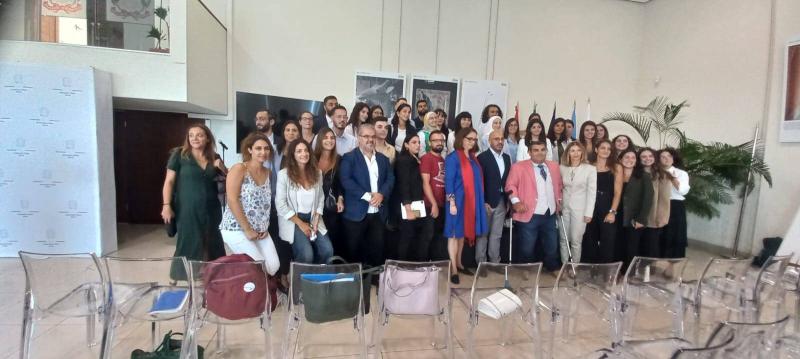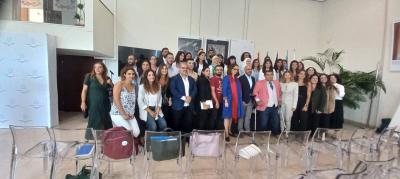The Italian Embassy in Beirut hosted a workshop today, Wednesday, at its Bouchrieh headquarters focusing on "The Role of Young Advocates in Climate Justice and Knowledge to Combat Climate Change." The aim of this workshop, organized in partnership with the United Nations Development Programme (UNDP) and the Lebanese Ministry of Environment, is to empower Lebanese youth and provide them with the necessary tools to raise their voices ahead of the United Nations Climate Change Conference (COP28) to be held in the United Arab Emirates in November 2023.
The event gathered around 40 Lebanese youth, including experts, activists, and students in the field of climate change. Ms. Rim Asaad, a founding member of the NGO "Sustainability of the World," presented the I.ACT global program, which is a training initiative offered by the International Renewable Energy Agency (IRENA) thanks to a grant from the Italian government. The I.ACT program is a "toolkit for climate action," which is an interactive educational platform containing techniques and information to enhance climate advocacy. The modules range from in-depth analysis of climate and energy trends to strategies for achieving just and inclusive transformations and increasing reliance on renewable energy sources.
On this occasion, the Italian Ambassador Nicoletta Bombardieri stated, "Climate change has indeed become a painful reality worldwide. The Mediterranean countries, being a hotspot for global warming, are particularly exposed to extreme weather events, increasing desertification, and declining agricultural productivity. The consequences of inaction today will primarily affect future generations. In this spirit, Italy believes that youth-led initiatives are essential to ensure comprehensive and sustainable solutions for climate adaptation and emissions reduction."
It is noteworthy that Lebanon has experienced the fastest rate of temperature increase, averaging 0.49 degrees Celsius per decade, which, along with changes in rainfall patterns, has led to a nearly 5 percent decrease in per capita GDP between 2000 and 2019 due to economic losses.
Regarding the importance of youth participation at the policy level, Minister of Environment Nasser Yassin mentioned, "The challenges facing Lebanon are significant, but its potential is also great, which is why the ministry has prioritized the inclusion of youth in the delegation over the past two years. As for the UN Climate Change Conference (COP28), 34 percent of the delegates are youth, including two young technical negotiators who will sit at the table and negotiate on behalf of Lebanon. By ensuring youth participation in the delegation, we harness the enthusiasm that can drive the transformative changes we need and ensure that the priorities of young Lebanese advocates are reflected on the international climate stage."
For her part, UNDP Resident Representative Melanie Hoenstein affirmed, "Together, we can harness the energy and innovation of our youth, while also recognizing the responsibility of the older generation in addressing climate change. It is important for political leaders to work alongside youth, civil society, and the private sector to design a sustainable and climate-friendly economic model. This remains the only way to preserve the beauty and potential of Lebanon for future generations."
In detail, Ms. Rim Asaad was selected alongside other youth leaders from around the world for the first phase of the program aimed at "training trainers." The event hosted by the embassy opens the second phase, where trainers can disseminate the knowledge gained using a toolkit provided by the I.ACT program to other youth leaders, thereby enhancing the empowerment of the younger generations, the real agents of change. The results of the workshop will be showcased at the upcoming main event YOUTH4CLIMATE organized by UNDP in Rome next October. The YOUTH4CLIMATE initiative, launched by Italy in 2021 before the 26th session of the Conference of the Parties, has become a well-organized mechanism coordinated by UNDP, offering youth leaders a formal opportunity to present concrete solutions to the political leaders participating in climate negotiations. For the past fifteen years, UNDP has worked with the Italian government to mitigate the impacts of climate change on Lebanon and integrate it into development plans and reforms. The cooperation extends to various sectors, such as contributing to the promotion of natural reserves in Lebanon, improving solid waste management in Baalbek, and operating the wastewater treatment facility in Zahle.




